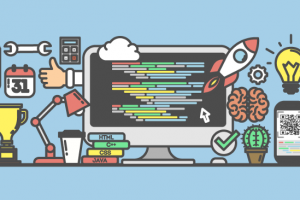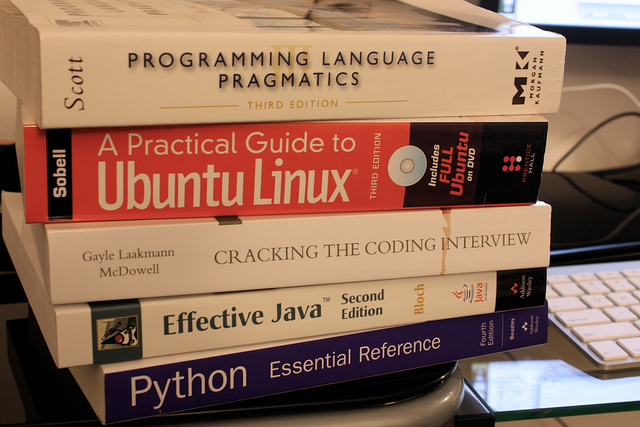Learn Programming Faster with these 7 Critical Tips


To become a better programmer, you have to be really good when it comes to the data structure, algorithms, design using OOPS, multi-thread and several other programming concepts, for example, recursion, divide and conquer, prototyping and unit tests.
Programming requires combining several skills or abilities, which implies that it is not possible to learn to program in a short period of time. Rather it is a process that involves time and experience and will not happen automatically.
But in this article, I am going to give you 7 essential tips to learn programming faster. These golden rules, each more important than the previous one, are as simple as they are powerful. I advise you not to take them lightly. You will notice how your development time is drastically reduced, without changing your work style.
1. Think about the main objectives of your application:
Always focus on your main motive behind the project. Keep your goal very clear. If you are going to make an application to share photos, the purpose of your application is to share photos. If you are going to make a chat, your goal is to chat. In both cases, your main objective will not be, or add features related to profile photos, or put the menu with dynamic shading, or any kind of extra that you can think of. Be clear about this. What will be your outcome of the project, you should be aware of that. This enables your thinking towards the main objective of your application and your mind will not be diverted on other problems. Forget about the secondary functionalities. Get in the head that your objectives are to program an application prototype with the fair and necessary that allows you to make it work and fulfill what you have in mind to do. You can add extra functionalities later but primarily you should concentrate on the main features only.
2. Read programming books:

There is a big difference between good code and poor code. This is obvious, but how can you distinguish them? Until you see a good code with your own eyes, it is difficult to understand the difference. And this is when the books are very useful since most of the time the authors are great programmers. They offer all their experience in book form. My advice is that if you can get hold of programming books, don’t hesitate. I also recommend reading more classic books and use them as reference books. Also, by reading, you are learning from someone else’s experience, and there are only two ways to improve: either through your own experience (which is limited) or through the experience of others.
3. Take help from the Internet:
Contribute to Open Source and sign up for Mailing lists. When you contribute to open source projects, especially from Apache, Google, and some others, this is another way to improve your skills as a programmer. The simple fact of registering mailing lists and following the debates and current events teaches you a lot. Because most of the debates are between good programmers, by paying attention you understand the problems and the approach they are given, the solutions and points of view, etc. Over time you automatically acquire good programming habits. To get the most out of them, ask questions, give your point of view if you can, but also weigh and weigh the points of view of others. Be the part of programming communities and forums to solve problems while coding. Stackoverflow is a very good platform to solve queries related to coding where programmers can ask questions and experts in that field can answer your questions.
Also read,
4. Make small increments of code in your application:
Make small modules and then test them. This will save your time in debugging a long code. Leave that bad habit you have to write all the entire code and then debug. Doing things this way will waste more than twice as much time in debugging, than in developing code. Remember those hours you lost looking for mistakes that ultimately turned out to be very “dumb.” The test must be very fast. This is important because it cannot interfere with your real work. It has to be as fluid as possible. In addition, your modifications should be focused on causing small changes that you can easily check. In this way, you will always have perfectly bounded errors and you will know the effect that each small step has caused to your application. Write the indispensable code then order it. Every small increase in code should be as fast as possible. For this, we need to make what we want to “add” work as soon as possible. Therefore, it is important to write the essential minimum code so that the change we want to produce is functional. After verifying that the change does what you want, rewrite the code so that it is clean and tidy. And check again.
5. Don’t make programming a recursive problem:
Whenever you try to program something, you will need to learn something new by searching for information online. Sometimes you realize that you need to apply a concept A. But to apply A, you need to understand another concept B. After a while with B, you realize that you need to understand another concept. With the passage of time, we can surprise ourselves trying to find the solution to a problem that is very far from the main problem. Do not fall into this trap. Find information, learn, but never get away from the problem you want to solve. Are you sure there is no simpler way? Maybe it’s time to stop for coffee and continue later.
6. Practice data structure, Algorithms, and design-related problems:
This is one of the most critical things when it comes to becoming a better programmer. Most of the good programmers are really good in the data structure, algorithms, and fundamentals. By mastering them, you can make the most of everything that is available. Because the structure of the data is a fundamental part of any program, its domain is very useful when troubleshooting. Similarly, a solid knowledge of the principles of programming, and search and sort algorithms, and other typical algorithms help you improve your skills as a programmer.
7. Talk to other programmers and developers:
Reading is a passive exercise when compared to speaking. Talking about development and discussing it with a partner often results in better development and a better application. And it is normal because when you speak your mind is more involved. Most of the programmers find bugs and gaps when discussing their developments with other developers. In the software industry in which programmers usually work in isolation on their computers, chatting and doing sessions on the board helps a lot. Do not sit and chop code, you must also listen, think and spend time with your fellow developers.
Conclusion:
Every programmer wants to improve as a programmer, but not everyone is capable. In addition to natural talent and being able to solve problems, it requires a lot of work, continuous training and consistency to become better. I hope these tips will help you to learn to program faster. Let me know which tip you find out most helpful?
